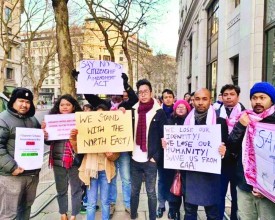The brutalisation of students has unnerved academic communities in Ivy League institutions and Oxford
There is reverse classism in the current establishment, negating the educated as prejudiced, damning liberalism as an elite obsession, diagnosing inquiry as a compulsive disorder and trusting the apparent as the only explanation. While humanism by itself wants an equitable society, it doesn’t come with dominance and subversion, it comes with a healthy respect for each other, dialogue and engagement. So though Home Minister Amit Shah may insist upon our Indic responsibility to save our people persecuted elsewhere, as promised by the Citizenship Amendment Act (CAA), he doesn’t want us to make much of the mindset behind the religion-based approach to asylum seekers. Or think that once linked with the National Register of Citizens (NRC), which relies on a complex process of documentation and could push out existing citizens as it has in Assam, it demonises the minority. Or that the majoritarian nationalism could swamp ethnicities as it has in Assam and Tripura. And if civilisational memory is what we need to revive, then exclusion was never our credo, something that students are reminding us because we ourselves have failed them in upholding what we preach. It is this failure to listen to the full story that is having a ripple effect on civil society. Now the protests in campuses over CAA have found echoes in top global institutions, including Oxford, Harvard, Yale and MIT. Over 400 students from different US universities have issued a joint statement expressing solidarity with Jamia and AMU students and condemned the brutal police violence as a gross violation of human rights. Students and scholars at Oxford University even staged a protest march to India House in London over a “direct attack on foundations of a democratic society.” Protests are also being planned in Zurich and Berlin, the last a crucible of how a polarised world could crumble under the weight of rigid lines. The Government would probably dismiss these as disruptive voices from the extended family of “urban Naxals” and consider them inconsequential to its larger purpose of Hindu revival. By that logic then, the entire community of academics and premium centres of learning are irrelevant to the Hindu cause simply because they don’t translate into votes. If the bull-headed short-sightedness of the Government is to be believed, then students everywhere have been delusional enough to be fooled by a country-specific agenda of India’s fragile Opposition. The establishment must realise that this is a collective conscience call of a democratic society that has come under the sharpest attack in recent memory. It is, perhaps, the first non-political hitback of the fear and distrust of the Modi Government in its current Hindu-only overdrive.
The brutalisation of students has clearly cost us our global perception as a tolerant society and though it would be easy enough to draw comparisons with crackdowns elsewhere, do we really want to be in the company of autocracies? Whether the Government admits it or not, it has had trouble explaining itself on lockdowns in foreign capitals, even in nations which had respected its right to abrogate Article 370 within its Constitutional space. Perhaps, more questions are being raised about India’s societal churn as we are blitzed with conquest-like images of a Howdy Modi event. But crushing students, who are the first-line protectors of a democratic legacy everywhere in the world, has been our undoing. Apologists would argue that Japanese Prime Minister Shinzo Abe, someone whom Prime Minister Narendra Modi considers a personal friend, had to postpone the proposed summit meeting here because Guwahati was supposed to be the venue. Couldn’t that be shifted? Two Bangladesh Ministers called off their visits although their Prime Minister Sheikh Hasina is “friendly” towards India. Anti-India travel advisories and positions taken in Western capitals against our sectarian approach have impacted our international image. The Government has clearly overreached itself in pushing both NRC and CAA down our throats. For a while, there has been no big bang talk of reforms or projects that fires the national imagination. What we forget though is that we do not have the heft of China yet to live down the war of perception. That’s precisely because the world respects us as a different Asian power and expects us to keep democracy alive.
(Courtesy: The Pioneer)








 OpinionExpress.In
OpinionExpress.In















Comments (0)